In-depth analysis from Food Poisoning Bulletin
In 2021, meat and poultry recalls rose from their all-time low in 2020 but were still well below recent averages, according to a review by Food Poisoning Bulletin. Prior to the pandemic, the four-year annual average was 128 recalls with an average of 26 recalls for bacterial contamination by one of the three major pathogens – E. coli, Salmonella and Listeria.
In 2020, just 32 recalls were issued for meat and poultry and only one of them was for bacterial contamination. In 2021, there were a total of 47 meat and poultry recalls. Of those, 11 were for E. coli, Salmonella or Listeria. That’s a significant increase from 2020’s solitary E. coli recall, but it’s a 58 percent decline from the pre-pandemic four-year average.
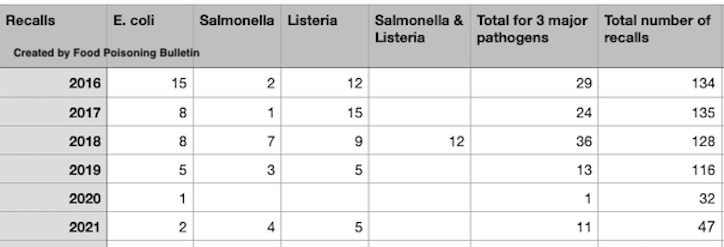
Undeclared Allergens and Catfish Smugglers
“Misbranding or undeclared allergen” is typically the most common reason for a recall. And that was the case in 2021. Of the 47 recalls issued last year, 11 were for misbranding or an undeclared allergen. Another 11 were for lack of inspection, nine were for foreign matter, one was for excessive lead levels and three were product smuggling by an ineligible importer. (One for catfish, two for beef, all three from China.)
The remaining 12 recalls were for bacterial contamination. One was for Bacillus cereus, two for E. coli, four for Salmonella and five for Listeria.
It is illegal to sell any ready-to-eat foods that are contaminated with Salmonella, E. coli, or Listeria. But the U.S. Department of Agriculture’s Food Safety and Inspection Service (USDA FSIS), the federal agency that regulates meat and poultry, uses performance standards or, as many consumers are horrified to discover, allowable percentages of Salmonella, for raw poultry products and ground beef.

USDA FSIS chart of current poultry performance standards
When there is a poultry Salmonella outbreak, the agency will only ask a company to issue a recall if an unopened package of or poultry taken from an outbreak patient’s home tests positive for the specific strain of Salmonella linked to the outbreak according to genetic tests.
Bacteria and White Plastic Bits, How Problems Were Discovered
USDA FSIS posts meat and poultry recalls on its website. These recalls generally include information about how the problem was discovered.
In 2021, USDA FSIS discovered the problem in 20 of the 47 recalls through various methods. Just three of these were found through product sampling. Most were discovered through records reviews. Notably, two Listeria recalls were discovered through records review. In one case, USDA FSIS found records that indicated the firm received confirmation from their third-party lab that a product contact surface had returned positive for Listeria monocytogenes. The other recall, for Nick’s s FAMOUS Hickory Smoked Pork Bar-B-Q,” does not specifically state what the records showed.
Consumers were next. They found the problem in 11 of the 47 recalls, most often by finding foreign matter in their food. In fact, individual consumers and the staff at one restaurant are credited with discovering the problem for all but one of the recalls for foreign matter in 2021.
For six of the recalls, companies found the problem in their own products. Six of the remaining problems were discovered by other government agencies either through routine sampling or testing done in association with an outbreak. Three recalls were generated from anonymous tips and one, for ground beef containing tiny bits of white plastic, was discovered by the staff of a restaurant.
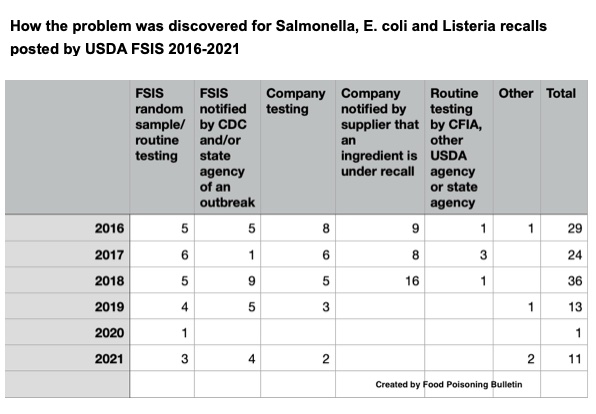
Outbreaks Linked to Recalled Meat and Poultry
The Centers for Disease Control and Prevention (CDC) announced 17 outbreaks in 2021. Eleven of the outbreaks were linked to foods regulated by the U.S. Food and Drug Administration (FDA) including seafood, cheese, onions, cake mix, and salad greens. Five outbreaks were linked to USDA FSIS-regulated foods including outbreaks linked to salami, Italian-style meats, cooked chicken, frozen breaded chicken items, and ground turkey. For one outbreak, health officials weren’t able to identify the food source.
Of the five outbreaks linked to meat or poultry, four were due to Salmonella contamination, one was caused by Listeria.
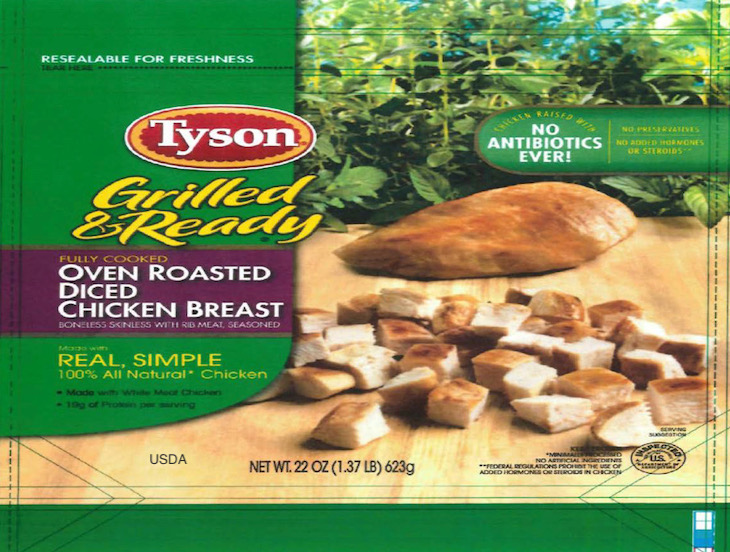
The Only Fatal Outbreak
A Listeria outbreak linked to Tyson cooked chicken was the only meat or poultry outbreak in 2021 that included a fatality. The outbreak was announced on July 2, 2021. The next day Tyson issued a recall for 8.5 million pounds of cooked chicken products produced at the company’s plant in Dexter. Weeks later it was expanded to include another half million pounds. It was the largest recall of the year.
The recalled Tyson products were sold nationwide under a number of brand names including Casey’s General Store, Jet’s Pizza, Little Caesar’s Pizza, Marco Pizza, Tyson, and Tyson Red Label. A secondary recall for chicken salad sandwiches, chef salads, and Caesar salads prepared by LSG Sky Chefs was also issued. Those items were sold at Circle K stores in Arizona and Southern California.
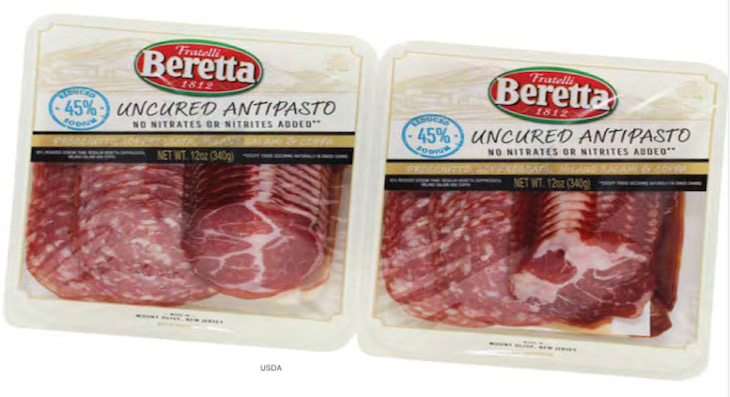
Italian-Style Meats Get Unwanted Attention
2021 put the spotlight on salami and Italian-style meats for all the wrong reasons. Last year, two outbreaks were linked to salami or Italian-style meats. In the 15 years of annual outbreak lists available on the CDC’s website, 2021 is the only year when more than one of these outbreaks occurred.
Both were Salmonella outbreaks. One was linked to Citterio Premium Italian-Style Salame Sticks, the other to Fratelli Beretta antipasto trays. There were also four recalls for these kinds of meats. In recent history, there hasn’t been another year with as many recalls for these types of meats.
One of these recalls was issued in connection with the 17-state Salmonella outbreak linked to Fratelli Beretta antipasto trays that sickened 40 people, hospitalizing 12 of them. On August 27, 2021, Fratelli Beretta of Mount Olive, N.J. issued a recall for 431 tons of antipasto trays containing salami, prosciutto, coppa, and soppressata.
The recalled trays, sold at Costco stores and elsewhere, had “best by” dates of August 27, 2021, through February 11, 2022. Despite the recall’s enormous size, the CDC released a statement days after it was issued saying it wasn’t big enough and warned customers not to eat any Fratelli Beretta brand antipasto trays with “best by” dates on or before February 11, 2022.
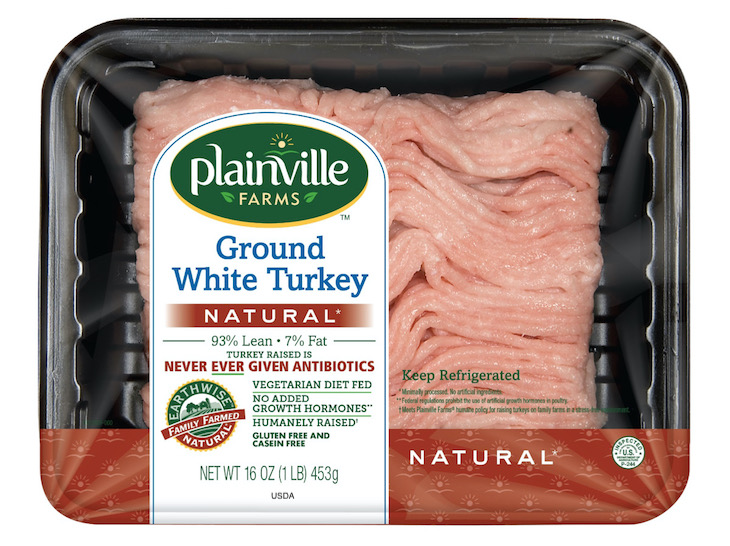
Outbreak, No Recall
Because food companies issue recalls voluntarily with guidance from the applicable regulatory agency, recalls were only issued in association with four of these outbreaks. For a Salmonella outbreak linked to ground turkey produced by Plainville Brands, LLC of New Oxford, PA, a recall was never issued.
The ground turkey Salmonella outbreak, announced by the CDC on April 12, 2021, sickened 33 people in 14 states, hospitalizing four of them. The ground turkey associated with the outbreak was produced by Plainville Farms and sold under the brand names Plainville Farms, Wegmans, and Nature’s Promise, a store brand for Food Lion, Giant Food, Giant/Martin’s, Hannaford, and Stop & Shop.
Health officials used genetic testing to identify the genetic fingerprint of the Salmonella Hadar outbreak strain. The Salmonella cultured from all outbreak patients had this fingerprint and so did a strain found in an unopened package of Plainville Farms ground turkey collected from a patient’s home. Tests showed the outbreak strain of Salmonella Hadar cultured from patients and product samples was resistant to one or more antibiotics.
Because the implicated products had “use or sell by” dates ranging from 1/1/21 to 1/10/21, USDA FSIS said consumers may have still have the products in their freezers, the agency issued a public health alert for the ground turkey two days before the outbreak was announced.
There is another reason that a recall wasn’t issued.
Salmonella in Turkey
The poultry industry has a Salmonella problem and some strains are widespread. During a turkey Salmonella outbreak in 2019, public health officials discovered that Salmonella Reading was “widespread in the turkey industry, and therefore, interventions should target all parts of the supply chain, including slaughter and processing facilities and upstream farm sources.” The CDC closed its investigation of that outbreak in April 2019 because case numbers had decreased. But they didn’t stop.
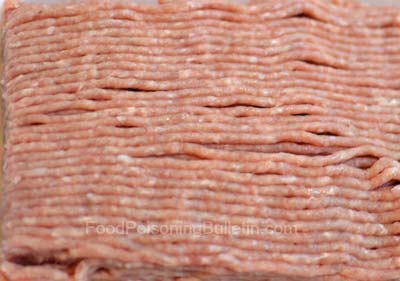 During the investigation of this Salmonella Hadar outbreak, health officials made a similar discovery. Not all of the illnesses could be linked to ground turkey produced by Plainville Brands, according to the CDC.
During the investigation of this Salmonella Hadar outbreak, health officials made a similar discovery. Not all of the illnesses could be linked to ground turkey produced by Plainville Brands, according to the CDC.
Outbreak patients reported buying a variety of ground turkey brands from multiple stores. Product testing by state health officials and other regulatory bodies found the outbreak strain in “several turkey products.” And, when USDA FSIS traced back the origin of the products purchased, 13 facilities were implicated. It’s not clear why those results were not made public.
A Food Poisoning Bulletin review of USDA FSIS data from 2015 through September 2020 shows ground turkey tested positive for Salmonella Hadar 104 times and whole carcasses tested positive 11 times. During that period, the companies with the most positive tests for Salmonella Hadar were:
- Foster Frams, Turlock, CA (13)
- Cargill Meat Solutions, Dayton, VA (11)
- The Hillshire Brands Company, Storm Lake, IA (10)
- Jennie-O Turkey Store Sales, Willmar, MN (10)
- Jennie-O Turkey Store Sales, Barron, WI (9)
- Abbyland Foods Inc., Abbotsford, WI (9)
- Plainville Brands, LLC, New Oxford, PA (7)
- Michigan Turkey Producers Co-op, Inc., Grand Rapids, MI (5)
- Butterball LLC, Carthage, MO (5)
During the first nine months of 2020, the companies with positive tests for Salmonella Hadar were:
- Abbyland Foods Inc., Abbotsford, WI (7)
- Cargill Meat Solutions, Dayton, VA (4)
- Butterball LLC, Carthage, MO (1)
- Foster Frams, Turlock, CA (1)
- Jennie-O Turkey Store Sales, Barron, WI (1)
- Plainville Brands, LLC, New Oxford, PA (1)
Public Health Alerts
USDA FSIS uses Public Health Alerts as a way to notify the public about a problem with a meat or poultry product, but these alerts don’t have the same weight or reach as a recall. It’s not likely that a consumer will see a sign posted at a grocery store about a USDA FSIS health alert, or receive an email about one.
In 2021, USDA FSIS issued 16 Public Health Alerts. Five were for bacterial contamination, three for Salmonella and one each for Listeria and E. coli. Six of them were misbranding/undeclared allergens, two were for foreign matter, two for smuggled products, one for lack of inspection.
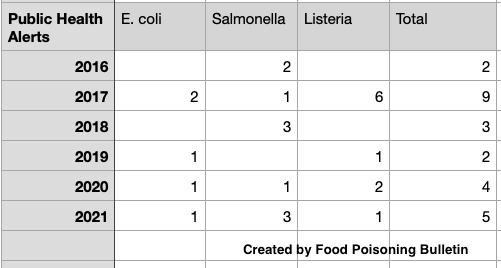
USDA FSIS issues Public Health Alerts for a variety of reasons. Often it’s a situation similar to the Plainville ground turkey outbreak, the agency believes the contaminated products are no longer on the market. Sometimes it’s during an outbreak investigation when the implicated company doesn’t issue a recall, as was the case with a Salmonella outbreak linked to stuffed, breaded chicken products. And sometimes it’s a little of both, which is how things unfolded with a Salmonella outbreak linked to salami sticks.
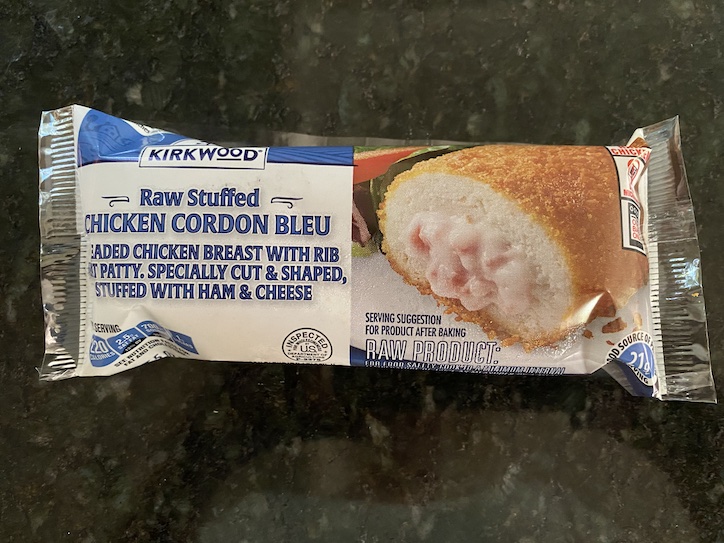
Breaded Chicken Salmonella Outbreak or Yes, There’s Salmonella in That Product But Can You Prove A Sick Person Ate It?
A Salmonella outbreak linked to breaded, stuffed chicken sold under the brand names Milford Valley, Dutch Farms, and Kirkwood was announced by the CDC on June 2, 2021. In the announcement, the CDC stated that the Minnesota Department of Agriculture had found the outbreak strain of Salmonella Enteritidis in two samples of Kirkwood brand Chicken Cordon Bleu after collecting five such products from a grocery store where an ill person shopped. Kirkwood is an ALDI store brand.
Seventeen illnesses in six states had been reported among people who had eaten breaded, stuffed chicken products before they became ill. But a recall wasn’t issued.
Instead, USDA FSIS issued a Public Health Alert for the products that day. It stated in part, “At this time, the production lots tested in Minnesota are not known to have been purchased by any of the case patients. FSIS has not received any purchase documentation, shopper records, or other traceable information at this time.” The alert went on to remind consumers to handle raw poultry safely. It did not name Kirkwood, ALDI, or any other brand name or store.
The Milford Valley, Dutch Farms, and Kirkwood breaded chicken products were all made by Serenade Foods of Milford, IN. And this wasn’t the first time the company’s products had been linked to an outbreak. In 2006, Kirkwood stuffed, breaded chicken products, made by Serenade Foods were recalled in connection with a Salmonella Enteritidis outbreak that sickened 29 people in Minnesota and Michigan.
On August 9, 2021, two months after the outbreak was announced, Serenade issued a recall after USDA FSIS and Indiana officials found the outbreak strain in unopened packages of Kirkwood Chicken, Broccoli and Cheese they had collected from a sick person’s house. By this point, the outbreak had grown to include at least 11 more illnesses and two additional states.
The recalled products were sold at a number of stores including ALDI, Al’s, County Market, Martin’s Meijer, Save A Lot, Strack & Van Til, and Walmart. By the time the outbreak ended on October 13, 2021, 36 people in 11 states had been sickened. Twelve people were hospitalized.
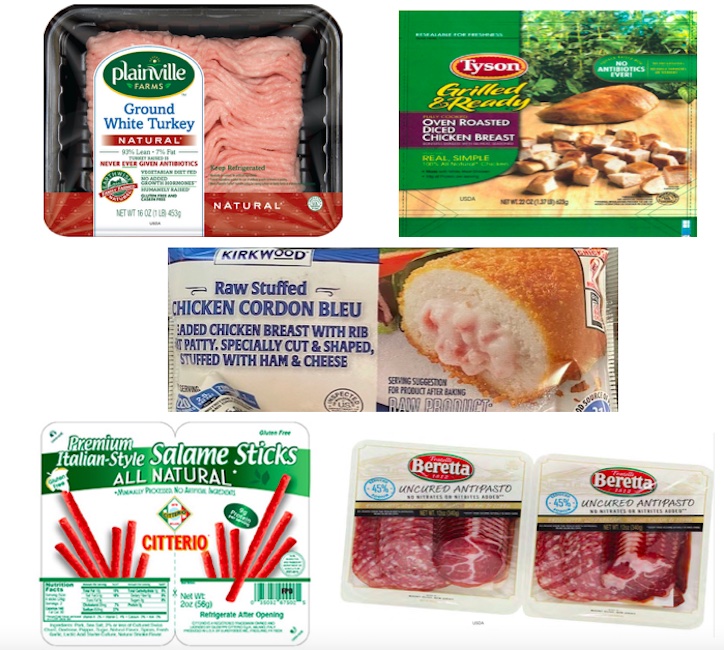
Salami Stick Salmonella Outbreak, What’s Wrong With This Timeline?
On October 23, 2021, the CDC announced a Salmonella I 4,[5],12:i:- outbreak linked to Citterio brand Premium Italian-Style Salame Sticks. Genetic tests showed the Salmonella from all patients and one sample or raw pork had genetic fingerprints that closely resembled each other. Eight of the nine patients interviewed by health officials named Trader Joe’s when they were asked where they bought the salami sticks.
After being informed about the outbreak, Trader Joe’s stopped selling the salami sticks, according to the CDC. But neither Citterio nor Trader Joe’s issued a recall for the salami product.
On October 27, 2021, the CDC announced it had discovered that the salami sticks were also being sold at Wegmans stores. At that time, Wegmans did not issue a recall.
Also on October 27, 2021, Food Poisoning Bulletin reported that the salami sticks were part of Citterio’s September Facebook giveaway. Winners of this promotion received salami sticks linked to the multistate outbreak.
On October 29, 2021, USDA FSIS issued a public health alert for Citterio “Premium Italian-Style Salame Sticks ALL NATURAL” with “best by” dates up to January 23, 2022. The agency said it did not request a recall from the product manufacturer because a specific lot or lots of potentially contaminated salami sticks had not been identified and the products were no longer being sold at Trader Joe’s and Wegmans. By this time, 21 people had been sickened, 80 percent of them were children.
On November 10, 2021, Euro Foods of Freeland, PA, issued a recall for the salami sticks after California health officials found Salmonella in two unopened, intact, packages of them that they collected from a patient.
Whole genome sequencing showed the strain cultured from these products, Salmonella Derby, was not closely related to the Salmonella I 4,[5],12:i:- strain cultured from patients. The CDC did not identify any Salmonella Derby illnesses associated with the salami sticks. However epidemiologic and traceback investigations identified Citterio salami sticks as the source of this outbreak. Of the 27 patients interviewed by health 26 reported eating salami sticks before they became ill and 25 specifically named Citterio brand Premium Italian-Style Salame Sticks.
By the time the outbreak ended on December 8, 2021, 34 people had been sickened, seven of them were hospitalized. The median age of outbreak patients is 8 years old.





